It’d be GREAT if you could manage to add the Census data from Australia too!
MyHeritage Census Helper™ Gets a Major Upgrade
- By Esther
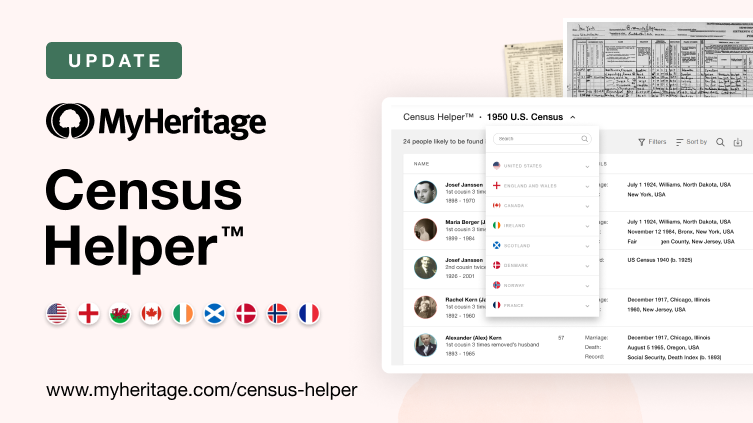

Just before the release of the 1950 U.S. Census in April 2022, we released the Census Helper™, a tool that scans your family tree and compiles a list of your relatives who are very likely to be found in census records. In the initial release, the Census Helper™ calculated a list of family members to find in the newly released 1950 U.S. census records as well as all available U.S. census collections. Now, we have expanded the Census Helper™ to include census records from other countries, so people with roots in places outside the U.S. can take advantage of it as well — and we’ve added some handy interface improvements that we’ll expand on below.
Use the Census Helper™ now for free
The Census Helper™ is a powerful free tool that offers help with census research and enables you to focus your research. Armed with the list it creates, you’ll know exactly which family members to search for in census records.
Genealogists were excited to jump-start their research ahead of the 1950 U.S. Census release: for example, Maureen Taylor, the “Photo Detective”, commented on how quickly it helped her. “This is very handy!” she wrote. “I hadn’t gotten around to making a list. The Census Helper™ did it in seconds.”
With this current update, the Census Helper™ now supports nationwide censuses in the United States, Canada, England and Wales, Scotland, Ireland, France, Denmark, and Norway.
For example, if you are a MyHeritage user with Danish roots, you’ll be able to use the Census Helper™ to find all the information on your relatives who likely appeared in the 1940 Denmark census — a unique collection exclusive to MyHeritage that isn’t found on other commercial websites. You‘ll also be able to see which people in your family tree might appear in the other nationwide census collections, and then find their records and save them to your tree.
We have also added some sorting and filtering capabilities that will make it even easier for you to make the most of this helpful tool.
If you haven’t yet used the Census Helper™, access the Census Helper™ on your family site under the “Research” tab on the navigation. If you don’t yet have a family tree on MyHeritage, now’s the perfect time to sign up and bring your tree over (via GEDCOM import) and benefit from this useful tool, which will save you time and give direction to your research.
Let’s dive into the update:
International census records
We have now added most census records currently available on MyHeritage to the Census Helper™. This includes the United States, England and Wales, Canada, Ireland, Scotland, Denmark, Norway, and France. Smaller-scale census record collections, for example, those that are limited to a specific region, are not featured in the Census Helper™.
By default, when you enter the Census Helper™, it will display the latest census collection that is available for your country of location, if available.
To pick a different census, use the census selector.
Scroll through the list to view all available census record collections, or enter the name of the collection you’re searching for into the search box.
Logic and additional cues used by the Census Helper™
When calculating the list of results for the Census Helper™ for European countries, we use a slightly different logic than we do for the U.S. Censuses.
When calculating people likely to be found in a U.S. Census, we believe it is enough to know that the person lived in the United States at one point in time, either before or after the census in question. This is because it wasn’t very likely for people to leave the United States after living there — although it is entirely possible that they still moved around. We use the same logic for determining whether a person would be found in the Canada, England, or Wales censuses.
In other European countries, especially during times of political upheaval and war, populations were much less stable. That means that the likelihood that a person located in that specific country before the census was taken would still be there at the time of the census was not as great. For example, if we have evidence that a person lived in Denmark in 1920, we can’t necessarily assume that they would be included in the 1940 Danish Census, as many people emigrated out of Denmark during those years. If we had proof that the individual was in Denmark after the census was taken, however, there is a much greater likelihood that they were there when the census was taken, so they will be included on the Census Helper™ list for that census.
To determine whether an individual may have been included in a given U.S. census, the initial version of the Census Helper™, searched for evidence that that person was in the United States at the time by analyzing place information entered for life events in the family tree. It also examined Record Matches the individual has to other U.S. collections, such as other U.S. census collections on MyHeritage, or the Social Security Death Index. We have now added which U.S. state the record is from to make it easier for you to search for the individual in the U.S. Census.
With this update, we have added the capability to determine U.S. residence at the time of the census based on further supporting evidence from Record Matches to the U.S. Public Records Index and the U.S. City Directories on MyHeritage. This new capability might expand your list to include additional people who weren’t there previously.
In this example, you’ll see that Betty was added to the list of people likely to be found in a particular U.S. Census based on the fact that a Record Match was found for her in the U.S. City Directories:
User interface changes
Some other capabilities have been added to allow you to easily work through your list of people likely to be found in certain census collections.
Filters allow you to filter results by the first letter of married or maiden last names.
The sort option offers the ability to sort by date added to the family tree (the previous default sorting option), your relationship to the individual, their age in the year the census was taken, or by their last name (maiden name for women).
Use the search bar on the right to locate a specific individual in the results. Type the beginning of the person’s first, middle, or last name and press enter to search.

We have also added the option of removing an individual from the list. This is very helpful for keeping an organized workflow. If you are systematically going through the list of individuals that may be in a particular census, you can remove those that you have determined are not in the census, and concentrate on your current up-to-date list.
Right-click on the three dots next to a name to remove them from the list.
Summary
The Census Helper™ continues to be a useful tool that helps genealogists save time while searching for their ancestors in census records — now from across the globe and not just the United States. We’ve improved the reports that it generates, and made it easier to use. We continue to offer it completely free of charge to MyHeritage users and non-users alike, and we warmly invite you to give it a try and see what new information you uncover about your family in census records from across the world!
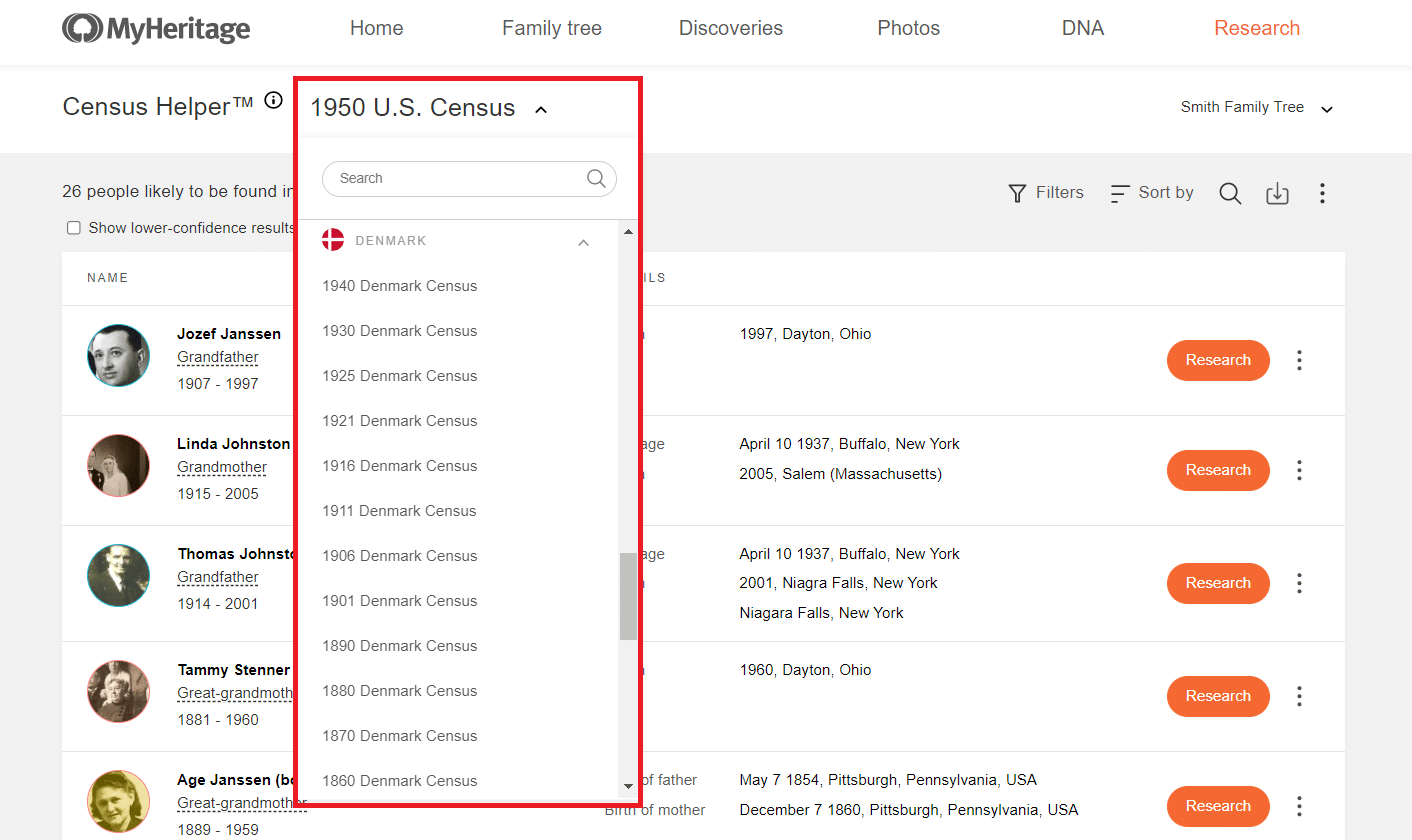


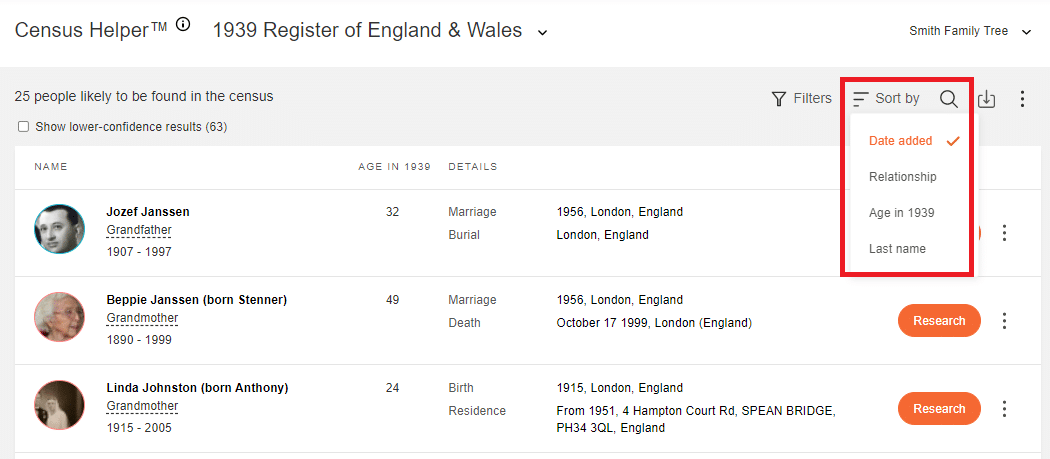
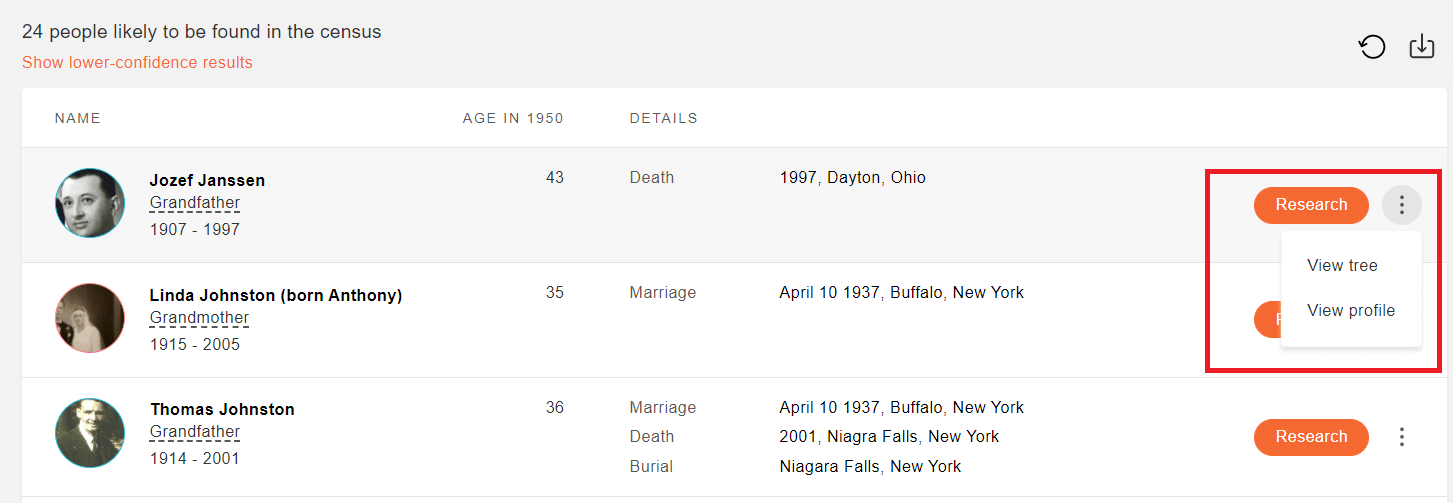

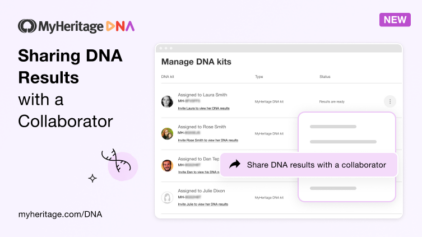
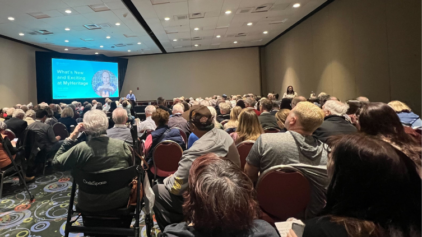



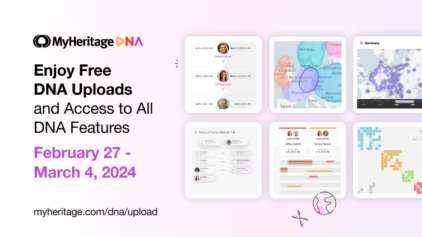



Harry
May 25, 2022
Looking to track down someone who was in the 91st southern highland in Edinburg scotland around the year 1873.